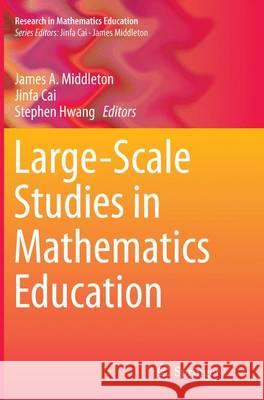Large-Scale Studies in Mathematics Education » książka



Large-Scale Studies in Mathematics Education
ISBN-13: 9783319344690 / Angielski / Miękka / 2016 / 432 str.
Large-Scale Studies in Mathematics Education
ISBN-13: 9783319344690 / Angielski / Miękka / 2016 / 432 str.
(netto: 390,56 VAT: 5%)
Najniższa cena z 30 dni: 385,52
ok. 16-18 dni roboczych.
Darmowa dostawa!
In recent years, funding agencies like the Institute of Educational Sciences and the National Science Foundation have increasingly emphasized large-scale studies with experimental and quasi-experimental designs looking for 'objective truths'.
Part One Introductory Section.- Chapter 1. On the Need for, and Traditions of, Large-Scale Research in MathematicsEducation.- Part Two Methodological issues.- Chapter 2. Measurement Issues in Large-Scale Mathematics Classroom Observation Protocols.- Chapter 3. Building Item Generation Environments Using Construct-Centered Design with Learning Trajectories in Mathematics.- Part Three Curriculum and Instruction.- Chapter 4. Curriculum and Implementation Effects on High School Students’ Mathematics Learning.- Chapter 5. Learning Mathematics Using Standards-Based and Traditional Curricula: An Analysis of Homework Problems.- Chapter 6. Gains in Teachers’ Knowledge and Changes in Instruction: A Three-Year Study of Mathematics Knowledge, Beliefs, and Teaching.- Chapter 7. Factors Influencing STEM Preparedness: From Algebra to Calculus.- Chapter 8. Effectiveness of Schema-Based Instruction for Improving Seventh-Grade Students’ Proportional Reasoning.- Chapter 9. A Randomized Trial of Lesson Study: Impact on Teachers’ and Students’ Knowledge of Fractions.- Part Four National and International Studies.- Chapter 10. How is Students’ Mathematics Knowledge Changing? Evidence from NAEP.- Chapter 11. Teacher Practices and Eighth Grade Students’ Mathematics Achievement: Examining International Patterns.- Chapter 12. Measuring the Impact of Teacher Education on Learning to Teach Mathematics.- Chapter 13. Factors Influencing Participation in Mathematics and Physics.- Chapter 14. Effect of Intervention on Conceptual Change of Decimals in Chinese Elementary Students.- Chapter 15. Virtual Algebra Study, Jessica Heppen (American Institutes for Research) and her colleagues.-Part Five Looking into the future.- Chapter 16. Summary of Methodological Considerations for Large-Scale Research in Mathematics Education.- Chapter 17. Commentary 1. Jeremy Kilpatrick.- Chapter 18. Commentary 2. Alan Schoenfeld.- Chapter 19. Commentary 3. Ed Silver.- Chapter 20. Where the field needs to go?.
James A. Middleton is Professor of Mechanical and Aerospace Engineering at Arizona State University. Prior to these appointments, Dr. Middleton served as Associate Dean for Research for the Mary Lou Fulton College of Education at Arizona State University and as Director of the Division of Curriculum and Instruction. He received his Ph.D. in Educational Psychology from the University of Wisconsin-Madison in 1992, where he also served in the National Center for Research on Mathematical Sciences Education as a postdoctoral scholar for 3 years. Jim’s research interests focus in the following areas where he has published extensively: Children’s mathematical thinking; Teacher and Student motivation in mathematics; and Teacher Change in mathematics. He has served as Senior co-Chair of the Special Interest Group for Mathematics Education of the American Educational Research Association, and as chair of the National Council of Teachers of Mathematics Research Committee.
Jinfa Cai is a Professor of Mathematics and Education and the director of Secondary math education at the University of Delaware. He is interested in how students learn mathematics and solve problems, and how teachers can provide and create learning environments so that students can make sense of mathematics. He received a number of awards, including a National Academy of Education Spencer Fellowship, an American Council on Education Fellowship, an International Research Award, and a Teaching Excellence Award. He has been serving on the Editorial Boards for several international journals, such as the Journal for Research in Mathematics Education. He was a visiting professor in various institutions, including Harvard University. He has serves as a Program Director at the U.S. National Science Foundation (2010-2011) and a co-chair of American Educational Research Association’s Special Interest Group on Research in Mathematics Education (AERA’s SIG-RME) (2010-2012). He will be chairing a plenary panel at the ICMI-12 in Germany in 2016.
Stephen Hwang is currently a post-doctoral researcher working with Jinfa Cai in the Department of Mathematical Sciences at the University of Delaware. His research interests include the teaching and learning of mathematical justification and proof, the nature of practice in the discipline of mathematics, the development of mathematical habits of mind, and mathematics teacher preparation.
In recent years, funding agencies like the Institute of Educational Sciences and the National Science Foundation have increasingly emphasized large-scale studies with experimental and quasi-experimental designs looking for 'objective truths'. Educational researchers have recently begun to use large-scale studies to understand what really works, from developing interventions, to validation studies of the intervention, and then to efficacy studies and the final "scale-up" for large implementation of an intervention. Moreover, modeling student learning developmentally, taking into account cohort factors, issues of socioeconomics, local political context and the presence or absence of interventions requires the use of large data sets, wherein these variables can be sampled adequately and inferences made. Inroads in quantitative methods have been made in the psychometric and sociometric literatures, but these methods are not yet common knowledge in the mathematics education community. In fact, currently there is no volume devoted to discussion of issues related to large-scale studies and to report findings from them. This volume is unique as it directly discusses methodological issues in large-scale studies and reports empirical data from large-scale studies.
1997-2026 DolnySlask.com Agencja Internetowa
KrainaKsiazek.PL - Księgarnia Internetowa









